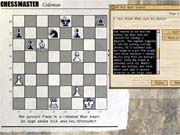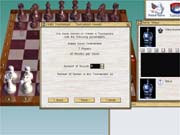For years, the Chessmaster series has rolled along unchallenged as the chess simulation of choice for a huge range of players, thanks to its combination of strong artificial intelligence, excellent teaching tools, and crisp graphics. In fact, the Chessmaster series has become so dominant in the mainstream chess game market that it's practically its own worst enemy. Will owners of the previous games in the series see enough new features in the latest game to make a purchase worthwhile?

They might--if they have the right operating system to run the game. Chessmaster 9000 supports Windows 98, ME, and XP, but not Windows 95, 2000, or NT. Omitting Windows 95 support is somewhat understandable. Leaving Windows 2000 owners in the lurch, on the other hand, seems a bit miserly. That's not to say the game absolutely won't run under Windows 2000--apparently, several users have reported that the game runs fine on their Win2K systems--but the lack of official support for a fairly widespread OS is somewhat disquieting.
Chessmaster's biggest strength has always been its suite of chess lessons, tutorials, and drills aimed at novice and intermediate players. In fact, it's difficult to think of ways that aspect of the program could even be improved. For Chessmaster 9000, the most notable addition is "The Psychology of Competition," an eight-part course consisting of nearly 20 annotated games assembled by international chess champion Josh Waitzkin. Though many of the tactical and positional aspects explored in these games are dealt with elsewhere in the program, Waitzkin's engaging narration is both exciting and educational.
It's sometimes difficult to keep track of the new drills introduced with each successive Chessmaster upgrade, but the two new drills are both great learning tools. In "follow the game" you must listen to (and read) a series of moves and then re-create the exact ending position (including which side is next to move), while "memorize the position" forces you to do just that--with up to 24 pieces on the board in the advanced drills. These are relatively simple, but they should dramatically assist players preparing for competitive play. Rounding out the tutorial enhancements are an endgame quiz authored by International Grandmaster Larry Evans (50 multiple-choice questions) and a "blunder alert" that tips you off when you're about to make a foolish move (only available in unrated practice games).
So what else does Chessmaster 9000 have that would make it worth buying for those who already own Chessmaster 8000? Some of Chessmaster 9000's additions seem rather trivial. For example, "true" 3D boards and pieces that can be rotated and zoomed in on have been added, but their value depends entirely on how you enjoy playing chess on a PC. For many, a simple 2D board is easier to analyze than an attractive 3D board that sometimes makes selecting the right piece a bit difficult. You can now assign yourself a rating when you create a player profile (rather than earning one by playing a set number of games against computer opponents) and then see it rise or fall with each qualifying game. A quick start mode sends you immediately into a game against a random opponent in a five-minute game using Fischer clocks, but why anyone would use it except for an occasional quick diversion is unclear.
More important for dedicated players is the improved Chessmaster chess engine and the availability of a downloadable endgame database generator. Though the game has been out for only a short while, early reports from users who've pitted it against other commercially available chess programs indicate that it's more than holding its own. But the most noteworthy test will come at the end of September 2002, when current US Chess Champion Larry Christiansen takes on Chessmaster 9000 in a four-game match. Even if Christiansen wins, it's clear that the only chess players who won't be severely challenged by Chessmaster 9000 are the ones who didn't need to improve their game in the first place.
And the endgame database generator creates a database containing perfect knowledge of all possible outcomes for all positions with very few pieces on the board. Ubi Soft, the publisher of the game, says its proprietary database format, called FEG (final endgame generator), is superior to more commonly used formats already in existence--though the inclusion of a proprietary format means users won't be able to take advantage of other endgame databases already available online.

Though there are other minor improvements, the last big change that Chessmaster 9000 makes to the series is actually a step backward: built-in multiplayer support via Chessmaster Live, which was last seen in Chessmaster 5500. This may be a case of too little, too late. There are now dozens (or perhaps hundreds) of ways to play chess for free online, and barring any future announcement of online tournaments or ladders, it's unclear how active Chessmaster Live will become--it was certainly dead during the two weeks following the game's US release. But things should hopefully pick up once the game ships in Europe, and if it becomes half as popular as the original Chessmaster Live, there should be plenty of competition to square off against soon enough.
If you're looking to pick up your first chess simulation, the decision is simple--no other product delivers the ease of use and instructional value of Chessmaster 9000. And if you own Chessmaster 8000, you might want to get Chessmaster 9000 to take your game to the next level with the new game's endgame database generator and seamless multiplayer interface.